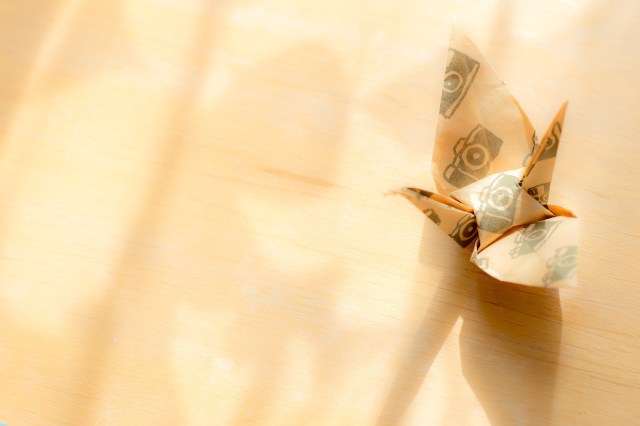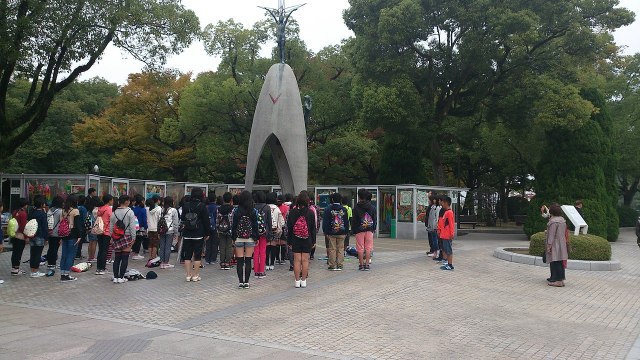
Perspectives are a tricky thing leading up to the production of One Thousand Paper Cranes.
One of the most enduring historical stories is that of Sadako Sasaki, the young girl who developed leukemia as a result of the atomic bombing of Hiroshima and folded over 1,000 origami paper cranes in the hopes that it would grant her wish of staying alive.
▼ Monuments to Sadako can be found all over the world, including this one in Hiroshima
Globally, Sadako is probably the most famous victim of nuclear weapons, and many people in western countries may have gotten acquainted with this story through the children’s novel Sadako and the Thousand Paper Cranes, written by Canadian-American author Eleanor Coerr in 1977.
https://twitter.com/welshwoman17/status/1124274476462563329Now, it’s been reported that Hollywood is set to produce One Thousand Paper Cranes, which follows the story of Coerr, played by Evan Rachel Wood (Westworld, True Blood), and how she came to make the book.
Evan Rachel Wood Tapped to Star in Hiroshima Drama 'One Thousand Paper Cranes' https://t.co/g5yghAUcPs pic.twitter.com/Yr5Echby69
— TheWrap (@TheWrap) May 3, 2019
Soon after, however, a strong reaction broke out over social media, with English-language comments such as:
“Great. Detracting from the story to make it about a white woman who wrote about it. Now she becomes the center of the story and the actual main character gets pushed aside.”
“I guess it will be about the heroic white person who wrote the book.”
“So they’re shifting the focus from Sadako Sasaki to the white journalist? Typical Hollywood…”
“Stop casting white women for WOC roles we don’t want it.”
“Love this story, won’t see it without representation.”
“I saw this movie when it was called The Last Samurai. Hard pass. Thank you. Next.”
“THIS IS AN OUTRAGE! ERW ISN’T EVEN CANADIAN! BURN ALL THE MOVIES!”
“‘Lets make the genocide of 140,000 people and the horrific suffering from the fallout into a story about white people.’ is the whitest thing ever.”
“More white savior garbage. No thanks.”
“I thought Sadako and the Thousand Paper Cranes by Eleanor Coerr had been on the school reading curriculum a few years ago. That’s why the story resonates with Americans.”
“Well, this is disappointing. But so typical. They can’t just create a film about Sasaki. No, they need to have a white person in there to shape it and make it ‘relatable.'”
Part of the reason for some of the outrage is something I’m guilty of too. The headline to the article everyone is reacting to read “Evan Rachel Wood Tapped to Star in Hiroshima Drama ‘One Thousand Paper Cranes’” which is clearly an oversimplification of the real situation, but much more economical that writing “Evan Rachel Wood Tapped to Star in Drama About the Woman Who Wrote the Popular Book About a Victim of the Hiroshima Bombing ‘One Thousand Paper Cranes.’”
But it was also confusing to the point that some people actually thought Wood was going to play the part of Sadako herself. It was enough to cause the film’s director Richard Raymond to issue a statement clarifying how the film is going to be presented.
https://twitter.com/richieraymond/status/1125614131996909568It still seems like a rather roundabout way to tell the story of Sadako, but it could work, especially if they delve into why Coerr changed the ending to the story from what really happened. Also, Raymond got the approval of the Peace Crane Project and the twitter account of Sadako Sasaki, though I’m skeptical its really her since it’s not verified.
https://twitter.com/richieraymond/status/1124796635173621761But more importantly let’s see what the regular people of Japan are saying online.
“I don’t really know enough about it to judge either way.”
“The movie is about the writer who helped teach people about Sadako. What’s the problem with this?”
“Actually, I would kind of be interested in seeing a movie about Hiroshima where everyone in the city was white instead of Japanese.”
“I would like to see Sadako (Evan Rachel Wood) vs Sadako (The Ring). FIGHT!”
“The writer was white, so I don’t see a problem. The stories of writers and journalists who show everyone the miseries of war are also important.”
“Why don’t they make a movie about the American soldiers who were victims of the bomb. Many American’s don’t even know about them.”
“I’m more bothered by the fact that they’re profiting off the story.”
“I still don’t know how Americans think they can keep getting away with making Godzilla movies.”
“All the Japanese parts are played by Koreans in Hollywood anyway.”
“If it helps more people in America learn about the story, then fine.”
“There seems to be a trend developing.”
That last comment is a reference to the production of Minamata which was announced late last year and is currently underway. In it Johnny Depp plays W. Eugene Smith, the American photojournalist who helped bring the world’s attention to the disfiguring effects of factory-induced mercury poisoning in the city of Minamata in Kumamoto Prefecture during the early 1970s.
Johnny Depp as W. Eugene Smith in @AndrewLevitas Minamata pic.twitter.com/PqfoBqejc4
— HanWay Films (@HanWayFilms) January 31, 2019
Despite nearly the exact same situation as One Thousand Paper Cranes and Wood, and with arguably even more of a “white savior” premise, Minamata and Depp strangely didn’t seem to receive nearly the same blowback from the public in the west.
▼ I know it looks like I’m setting these tweets up to prove a point, but I swear I couldn’t find a single even slight criticism of Depp as the “savior” of Minamata. There were some positive tweets about Wood to be found though.
Hey! A movie about Hiroshima. Guess what? It's about a white woman. The Anglo saviour strikes again. Where would any Asian or African person be without them? Thank the Lord for the American studio film industry to keep on reminding us. https://t.co/GaQQKwmEwc
— Tony Cavanaugh (@TonyCavanaugh1) May 4, 2019
I hope Johnny Depp has a good day, and is in general happy, in good health, loved, surrounded by good people and true friendships every single day, and is enjoying filming Minamata. He deserves good things and good things only. 💕 pic.twitter.com/wrqJykVd9s
— . (@__jacxpearls) February 8, 2019
The indifferent to positive response to both films in Japan is no surprise, however. Here in Japan people tend to not be bothered as much by such things, to the point that The Last Samurai, with its lead character an alcoholic white guy of dubious height, is actually quite well received.
▼ “I saw The Last Samurai. I was so engrossed in the battle scene that I forgot to breathe. It’s a nice day today. I’m in a good mood.”
『ラストサムライ』見た
— 山谷花純 (@minmin12344) September 18, 2018
戦さのシーンは、息を吸うのを忘れてしまうくらい見入ってしまいました。
今日は、晴れましたね。
気分良いです^ ^#ラストサムライ #映画 #movie pic.twitter.com/TdLJ2kBRfV
In the end, probably the most important sentiment is that if the movie helps to spread the important message of the lingering horrors of war then it can’t all be bad. Still, there is definitely something to be said for encouraging more films that offer more diverse perspectives as well, doing so can help to foster empathy and maybe even prevent future atrocities from occurring.
So, rather than attacking movies that we’re not even sure of yet, if we as a whole make a conscious, positive effort to support movies viewed from other perspectives with our money, the producers will listen and the tide will eventually turn.
And knowing Hollywood, when this truly wonderful and richly diverse cinematic landscape is achieved, they’ll want to make a movie about the white guy who suggested it…me! I think I’ll demand that the Ant Man guy plays my part.
Source: The Wrap, Variety, Yurukuyaru, Twitter/@TheWrap, Twitter/@richieraymond
Top image: Pakutaso
Insert image: Wikipedia/Children’s Peace Monument
● Want to hear about SoraNews24’s latest articles as soon as they’re published? Follow us on Facebook and Twitter!


 The Ring’s Sadako haunts one of Japan’s favorite hot springs for Halloween
The Ring’s Sadako haunts one of Japan’s favorite hot springs for Halloween Sadako vs Kayako glass hangers will make your drinks horrifyingly cute
Sadako vs Kayako glass hangers will make your drinks horrifyingly cute Victim of 3.11 to people who have never suffered a disaster: Don’t send origami cranes to shelters
Victim of 3.11 to people who have never suffered a disaster: Don’t send origami cranes to shelters What happens when you combine two of the scariest movies ever? You get Sadako vs Kayako!
What happens when you combine two of the scariest movies ever? You get Sadako vs Kayako! Sadako now has her own YouTube channel, hopes to upload videos about her daily life
Sadako now has her own YouTube channel, hopes to upload videos about her daily life Foreigner’s request for help in Tokyo makes us sad for the state of society
Foreigner’s request for help in Tokyo makes us sad for the state of society Seaside scenery, history, and so many desserts on Yokohama’s Akai Kutsu【Japan Loop Buses】
Seaside scenery, history, and so many desserts on Yokohama’s Akai Kutsu【Japan Loop Buses】 Japanese city loses residents’ personal data, which was on paper being transported on a windy day
Japanese city loses residents’ personal data, which was on paper being transported on a windy day Should you add tartar sauce to Japanese curry rice? CoCo Ichi makes diners an unusual offer
Should you add tartar sauce to Japanese curry rice? CoCo Ichi makes diners an unusual offer Ghibli Park now selling “Grilled Frogs” from food cart in Valley of Witches
Ghibli Park now selling “Grilled Frogs” from food cart in Valley of Witches Red light district sushi restaurant in Tokyo shows us just how wrong we were about it
Red light district sushi restaurant in Tokyo shows us just how wrong we were about it Mt. Koya planning to instate visitor’s tax to cope with huge tourist numbers
Mt. Koya planning to instate visitor’s tax to cope with huge tourist numbers Harajuku Station’s beautiful old wooden building is set to return, with a new complex around it
Harajuku Station’s beautiful old wooden building is set to return, with a new complex around it Smash Bros. director Sakurai stabs Kirby in the face, has delicious justification for it
Smash Bros. director Sakurai stabs Kirby in the face, has delicious justification for it Starbucks Japan releases new mugs and gifts for Mother’s Day
Starbucks Japan releases new mugs and gifts for Mother’s Day McDonald’s new Happy Meals offer up cute and practical Sanrio lifestyle goods
McDonald’s new Happy Meals offer up cute and practical Sanrio lifestyle goods Japanese ramen restaurants under pressure from new yen banknotes
Japanese ramen restaurants under pressure from new yen banknotes French Fries Bread in Tokyo’s Shibuya becomes a hit on social media
French Fries Bread in Tokyo’s Shibuya becomes a hit on social media Studio Ghibli releases new action figures featuring Nausicaä of the Valley of the Wind characters
Studio Ghibli releases new action figures featuring Nausicaä of the Valley of the Wind characters New private rooms on Tokaido Shinkansen change the way we travel from Tokyo to Kyoto
New private rooms on Tokaido Shinkansen change the way we travel from Tokyo to Kyoto Tokyo Tsukiji fish market site to be redeveloped with 50,000-seat stadium, hotel, shopping center
Tokyo Tsukiji fish market site to be redeveloped with 50,000-seat stadium, hotel, shopping center Beautiful Ghibli sealing wax kits let you create accessories and elegant letter decorations【Pics】
Beautiful Ghibli sealing wax kits let you create accessories and elegant letter decorations【Pics】 Studio Ghibli releases Kiki’s Delivery Service chocolate cake pouches in Japan
Studio Ghibli releases Kiki’s Delivery Service chocolate cake pouches in Japan New definition of “Japanese whiskey” goes into effect to prevent fakes from fooling overseas buyers
New definition of “Japanese whiskey” goes into effect to prevent fakes from fooling overseas buyers Our Japanese reporter visits Costco in the U.S., finds super American and very Japanese things
Our Japanese reporter visits Costco in the U.S., finds super American and very Japanese things All-you-can-drink Starbucks and amazing views part of Tokyo’s new 170 meter-high sky lounge
All-you-can-drink Starbucks and amazing views part of Tokyo’s new 170 meter-high sky lounge More foreign tourists than ever before in history visited Japan last month
More foreign tourists than ever before in history visited Japan last month New Pokémon cakes let you eat your way through Pikachu and all the Eevee evolutions
New Pokémon cakes let you eat your way through Pikachu and all the Eevee evolutions Disney princesses get official manga makeovers for Manga Princess Cafe opening in Tokyo
Disney princesses get official manga makeovers for Manga Princess Cafe opening in Tokyo Sales of Japan’s most convenient train ticket/shopping payment cards suspended indefinitely
Sales of Japan’s most convenient train ticket/shopping payment cards suspended indefinitely Sold-out Studio Ghibli desktop humidifiers are back so Totoro can help you through the dry season
Sold-out Studio Ghibli desktop humidifiers are back so Totoro can help you through the dry season Japanese government to make first change to romanization spelling rules since the 1950s
Japanese government to make first change to romanization spelling rules since the 1950s Ghibli founders Toshio Suzuki and Hayao Miyazaki contribute to Japanese whisky Totoro label design
Ghibli founders Toshio Suzuki and Hayao Miyazaki contribute to Japanese whisky Totoro label design Doraemon found buried at sea as scene from 1993 anime becomes real life【Photos】
Doraemon found buried at sea as scene from 1993 anime becomes real life【Photos】 Tokyo’s most famous Starbucks is closed
Tokyo’s most famous Starbucks is closed One Piece characters’ nationalities revealed, but fans have mixed opinions
One Piece characters’ nationalities revealed, but fans have mixed opinions We asked a Uniqlo employee what four things we should buy and their suggestions didn’t disappoint
We asked a Uniqlo employee what four things we should buy and their suggestions didn’t disappoint Princesses, fruits, and blacksmiths: Study reveals the 30 most unusual family names in Japan
Princesses, fruits, and blacksmiths: Study reveals the 30 most unusual family names in Japan Police looking for man who threw paper airplane into Hiroshima atomic bomb monument
Police looking for man who threw paper airplane into Hiroshima atomic bomb monument Japanese horror icon Sadako collaborates with Snickers in yummy commercial!
Japanese horror icon Sadako collaborates with Snickers in yummy commercial! Sadako vs Kayako take to the field as they open baseball game in Hokkaido
Sadako vs Kayako take to the field as they open baseball game in Hokkaido Tokyo taxis offer to let you take a ride with The Ring’s ghost girl, just in time for Halloween
Tokyo taxis offer to let you take a ride with The Ring’s ghost girl, just in time for Halloween Sadako & Kayako want your vote for the ghost with the most
Sadako & Kayako want your vote for the ghost with the most Hiroshima requests removal of Pokémon GO facilities from Peace Memorial Park
Hiroshima requests removal of Pokémon GO facilities from Peace Memorial Park Low-quality paper cranes folded by young gyaru – Japan’s newest weird capsule toys
Low-quality paper cranes folded by young gyaru – Japan’s newest weird capsule toys Japanese child’s sad story of learning that “goodwill” is sometimes just “self-satisfaction”
Japanese child’s sad story of learning that “goodwill” is sometimes just “self-satisfaction” Video accuses Your Name of copying two of its animation sequences from other anime【Video】
Video accuses Your Name of copying two of its animation sequences from other anime【Video】 Multiplayer horror game “Dead by Daylight” teases Japanese ghoul update, net freaks out
Multiplayer horror game “Dead by Daylight” teases Japanese ghoul update, net freaks out What do Japanese fans think of Lee Isaac Chung directing the Hollywood remake of Your Name?
What do Japanese fans think of Lee Isaac Chung directing the Hollywood remake of Your Name? Filipino youths with special needs find their place in the world through art and awareness
Filipino youths with special needs find their place in the world through art and awareness Drive My Car becomes first Japanese film to receive Academy Award Best Picture nomination
Drive My Car becomes first Japanese film to receive Academy Award Best Picture nomination French literature classic ‘The Little Prince’ coming soon to cinemas as an animated film!
French literature classic ‘The Little Prince’ coming soon to cinemas as an animated film! Mega-hit Your Name. reimagined as a horror movie is terrifyingly perfect
Mega-hit Your Name. reimagined as a horror movie is terrifyingly perfect
Leave a Reply